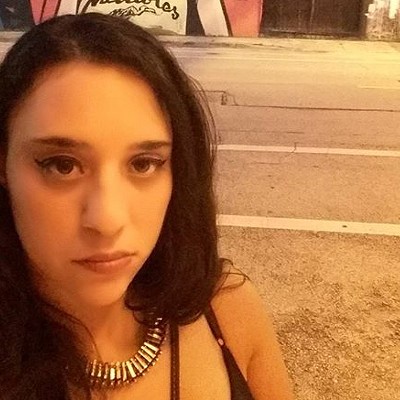The Fort Lauderdale library and Wilton Manors gallery known as the Stonewall National Museum & Archives began as a collection of queer erotica in a Hollywood basement.
Collector Mark Silber — at the time a Florida Atlantic University student — began collecting LGBTQ magazines, newspapers, and protest posters in 1973. Sensing — or perhaps stumbling into — a cultural sea change, he started his work just four years after the Stonewall Inn riots in New York's Greenwich Village. Today, the riots are commonly recognized as the beginning of the modern LGBTQ rights movement — even though other protests predated it.
Silber's decision to name the archives after Stonewall served two purposes, says Larry Karnoff, the museum's interim executive director. The word "Stonewall" not only paid tribute to the riots, but it also offered a coded reference to those in the LGBTQ community who might want to view the archives.
"There was a time 45 years ago where you would not put 'homosexual' on the front of your building," says Karnoff. "Bars used names that were referential." Silber knew people in the queer community would understand the archives were targeted at their history and culture. "It was a code name, in a sense."
Though the museum delves into queer history at large, with some artifacts dating back more than a century — an exhibit exploring the history of the Stonewall Inn riots is on display in Wilton Manors through August 11.
The exhibit walks viewers through the early days of queer civil disobedience. There are black-and-white photos of broken jukeboxes and cigarette machines at Stonewall and portraits of movement leaders such as Marsha P. Johnson and Sylvia Rivera. It also includes pamphlets and brochures by queer activist organizations such as the Gay Liberation Front.
"Do you think homosexuals are revolting? You bet your sweet ass we are!" reads a 1969 pamphlet, before demanding the repeal of anti-sodomy laws and calling for gay rights legislation. Fifty years later, the Equality Act — which would grant LGBTQ individuals federal protection against discrimination — has passed the House of Representatives but faces an uphill battle in the Senate.
This struggle is evidence of the major takeaway from a visit to the Stonewall Library & Archives: that LGBTQ history is living history.
That's most elegantly illustrated at the Wilton Manors gallery, where a signed pair of Ellen Degeneres's Adidas sneakers sits atop a riser inside a plexiglass box next to her pop culture-shifting "Yep, I'm Gay" Time cover. In front of those artifacts is a timeline of LGBTQ history that covers one of the gallery's walls. Collectibles hang on the wall above the timeline, including a gold Village People record and a baby pink blazer previously worn by Carson Kressley of Queer Eye for the Straight Guy. In front of an adjacent wall, a plexiglass box holds early editions of Oscar Wilde's A House of Pomegranates and an autographed copy of Walt Whitman's Two Rivulets. True to the archive's beginnings, these artifacts sit just feet away from a box selling gay romance novels for $1.
But the smut won't go into the bargain bin. As an independent institution, the Stonewall Museum & Archives has an advantage over similar organizations. "We have the ability to accept items university-affiliated institutions might not accept," Karnoff says. "There are articles [surrounding the erotica] that talk about what's happening in that world from the audience's perspective." Advertisements, for example, could give researchers insight into the products that were being marketed to queer individuals during different historical moments.
Keeping such materials available to researchers and the public is crucial to documenting queer history. A poster in Karnoff's office reminds visitors of that mission. "Unfortunately, history has set the record a little too straight," it reads, above portraits of queer figures including James Baldwin, Bessie Smith, and Eleanor Roosevelt.
"It reminds us that we need to capture our own history," says Karnoff, "so that it's not defined by other people."
Stonewall: 50 Years in the Fight For Equality at Stonewall Museum Wilton Manors Gallery. Open 11 a.m. to 6 p.m. Monday through Friday and 10 a.m. to 9 p.m. Saturdays at 2157 Wilton Dr., Wilton Manors. stonewall-museum.org. $5 donation is suggested.
Stonewall Library & Archives. Open 11 a.m. to 6 p.m. Monday through Friday and 10 a.m. to 4 p.m. Saturdays at 1300 East Sunrise Blvd., Fort Lauderdale. stonewall-museum.org. Admission is free. Memberships start at $35 and $25 for students.

Audio By Carbonatix
[
{
"name": "GPT - Billboard - Slot Inline - Content - Labeled - No Desktop",
"component": "16971022",
"insertPoint": "2",
"requiredCountToDisplay": "2"
},{
"name": "STN Player - Float - Mobile Only ",
"component": "18617832",
"insertPoint": "2",
"requiredCountToDisplay": "2"
},{
"name": "Editor Picks",
"component": "15769925",
"insertPoint": "4",
"requiredCountToDisplay": "1"
},{
"name": "Inline Links",
"component": "16575154",
"insertPoint": "8th",
"startingPoint": 8,
"requiredCountToDisplay": "7",
"maxInsertions": 25
},{
"name": "GPT - Rectangle 2x - Slot Auto-select - Labeled",
"component": "15782206",
"insertPoint": "8th",
"startingPoint": 8,
"requiredCountToDisplay": "7",
"maxInsertions": 25
},{
"name": "Inline Links",
"component": "16575154",
"insertPoint": "8th",
"startingPoint": 12,
"requiredCountToDisplay": "11",
"maxInsertions": 25
},{
"name": "GPT - Leaderboard to Tower - Slot Auto-select - Labeled",
"component": "15782207",
"insertPoint": "8th",
"startingPoint": 12,
"requiredCountToDisplay": "11",
"maxInsertions": 25
}
]









